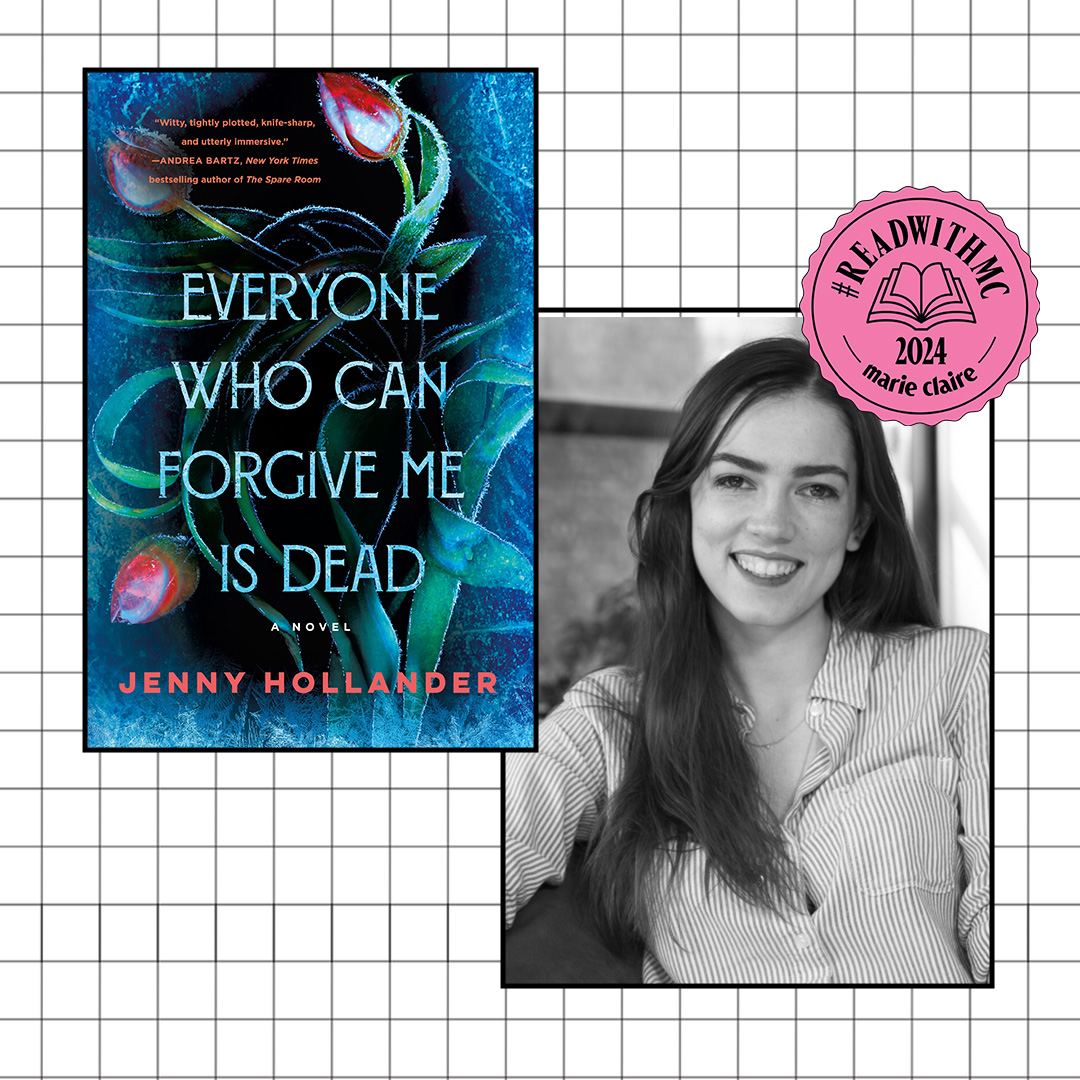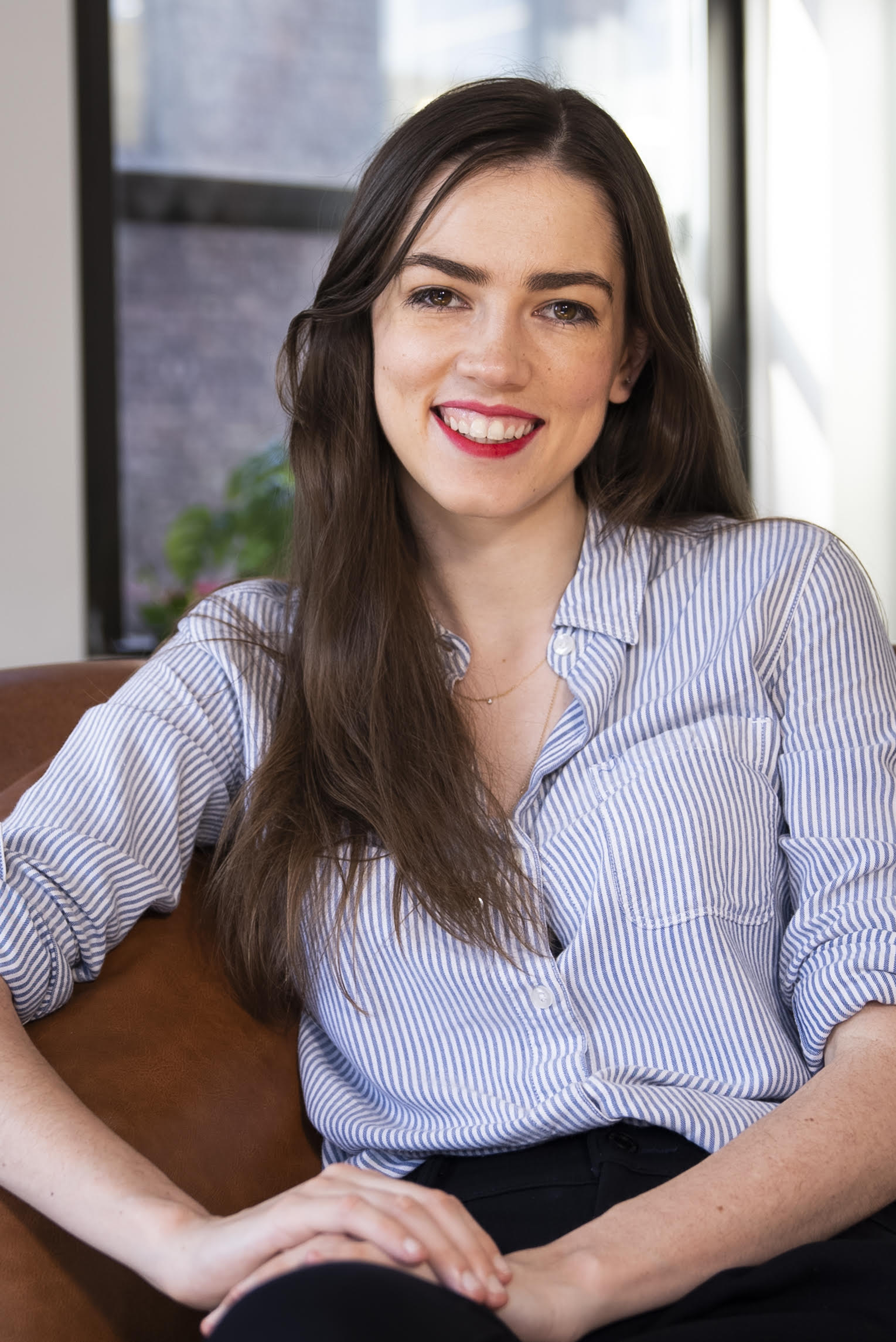
Welcome to #ReadWithMC—Marie Claire’s virtual book club. It’s nice to have you! In February, we’re reading Jenny Hollander’s Everyone Who Can Forgive Me Is Dead, a sharp, witty, nail-biting thriller that will firmly plant you on the edge of your seat—and keep you there. The book follows Charlie Colbert, editor-in-chief at C magazine, who's rebuilt her life following nightmarish events at her elite graduate school on Christmas Eve nine years prior—events known to the public as “Scarlet Christmas.” The press and the police called Charlie a “witness,” but Charlie knows she’s so much more than that. In the midst of her well-crafted life, a buzzy film made by one of Charlie’s former classmates threatens to shatter everything she’s worked for—and Charlie is determined not to let anything, even the people she once loved most, get in her way. It’s the debut novel by Hollander, who we are so proud to call one of our own. She's the digital director at Marie Claire, but we would have picked this page-turner even if she wasn’t—it’s hard to imagine a novel gripping us more than this one does. Read an excerpt from chapter two of the book below, then find out how to participate. (You really don’t have to leave your couch!)
When I get to the office marked “Dr. Nazari,” hidden inside a labyrinth of rooms in a Columbus Circle doorman building, I swap my heeled boots for sneakers— I’ve been in America so long, I don’t even think the word “trainers”— and pull an old sweater over my button- down. I’ve found I need a physical transition between my C self and my therapy self. Otherwise, I find myself talking to Noor in clipped tones, saying things like, “That’s part of my projected growth in Q2.” I’m exaggerating, but only a little. I’m paying a lot of money for someone to help me untie the knots in my head; I need to make sure it’s worth it. So, the sneakers and sweater.
“Charlotte,” Noor says in her gentle voice. She beckons me inside.
“Hi.” My voice is different when I talk to Noor, too— more low-key, more like I used to sound. C me, brusque and plummy, has to be shaken off like old skin. “Thanks for squeezing me in.”
“Of course,” Noor says. “You said it was an emergency?”
Gingerly, I lower myself onto the sofa. The movement— the feeling that I’m about to break— reminds me of my mum. “Steph wants to make a movie about it,” I say without preamble. “For the ten-year. I don’t know what to do.”
This isn’t exactly true. I spent the last few hours coming up with a Plan A, a Plan B, and a last-ditch emergency measure. But it’s not like I can tell Noor about those.
“This is Stephanie Anderson?” Noor says. “The KBC anchor?” She writes something down. “She was at Carroll University with you? The twin sister of . . .” She trails off. The word Cate— one of several we don’t use in this room— hangs between us.
“Yes.”
“And somebody would play you in this movie?”
“Of course.” It feels like there’s something stuck in my throat. There isn’t, obviously. It’s just what happens when I talk about Carroll. “Steph would cast someone, I guess.”
“I see.”
“I can’t,” I tell her. Usually I’m clear-eyed and composed in these sessions; I like to think I’m Noor’s most articulate patient. “I can’t,” I repeat.
“What can’t you do?” Noor asks.
“I can’t relive it. Not again.”
It’s the truth. There’s more, of course. But that much is true, too.
“You survived . . . it before,” Noor says carefully. Early on, I made her a list of terms to avoid. Scarlet Christmas. Gunnar Korhonen. Cate Anderson.
“But, this . . .” I try. Then I stop.
There were parts of me that did not survive. This I can say to Noor. What I can’t say is that if my lies are uncovered, I have no idea what will be left.
“This is different,” I say finally.
“Is it?” Noor says mildly. “Let’s talk about that. When it happened, you survived. When the book came out, you survived that, too.”
The book. I didn’t know it at the time, but Aaron Katz was building a time bomb from the moment it happened. In the weeks and months afterwards, the story was everywhere, complete with the moniker I do not say and never have. Just when I thought it had all died down, Katz got his book deal. The Fall came out on the second anniversary: the first complete account of a tragedy that transfixed a nation, told by the people who were there. And like an idiot, I read it.
It shattered me.

Months later, when I could leave my apartment again, after the prescriptions and the therapies and all the debt, I realized I no longer wanted to be a writer. There weren’t any words for what had happened. It wasn’t that I couldn’t find them, it was that they didn’t exist. Instead, I decided to become an editor: I wanted to work with words that already existed, not fish around for my own. Not when it felt so frustrating, so pointless.
I decided a lot of things that year. Like: I would never allow myself to break like that again.
“Things are different now,” Noor is saying. “We’ve been working together, what is it, seven years? Think of the skills you’ve developed. The ones you didn’t have when we first met.”
When we first met. Before Tripp, before C, before the Upper East Side town house and my green card. Tripp likes to talk about the moment he first saw me: “Drinking by yourself, making eyes at the servers,” he says. “I saw you and I thought, She has to be the most interesting person in the room.” (Then I say: “And then I started talking,” which always gets us a laugh at dinner parties.) But I prefer when Noor tells me about the first time she saw me. Masochistically, I like when she tells me I was bone- thin, gray, eyes darting around the room like a trapped animal. It reminds me that I am no longer that girl. That I could not go back to being her.
When I say that out loud, Noor gives me her usual spiel about how we are all only evolved versions of our past selves, that we carry all of them around in us like Russian dolls. I don’t often ignore Noor, but I do then.
She says, “Let’s talk about the building blocks of your life.”
We’ve done this exercise before. It’s meant to remind me that if one block falls— Tripp and I break up, for example— the others will stand. To be honest, it makes me feel like my life is a series of dominoes waiting to fall at once, but Noor says that’s my brain playing tricks on me. “Work,” I say immediately. “I am respected and admired at work. I was on the ‘40 Under 40’ list, a Person of the Year, I’ve won two awards for innovation in media, I was profiled by Forbes.” I’m starting to feel more like myself again.
“What else?”
“Well, Tripp. This time next year, he’ll be my husband.” I picture Tripp: his boyish, toothy grin, the way his hand shook when he held out the box with his grandmother’s ring. I remember it because it was so at odds with Tripp’s famous certainty. He loved me enough to be afraid. Until then, I had never seen him afraid. “And my family in London, of course. My sister.” Felicity, eighteen years old and the person I love most in the world. “My mum and dad.”
I’ll never forgive myself for what my family had to go through because of me. The reporters beating on Mum’s front door, the Daily Mail headlines, the kids in Felicity’s class asking questions until she cried. I was numb at that point, living in a thick gray cloud, but I can’t bear to think of it now. As if my parents hadn’t been through enough.
“My mum and dad, they love Tripp,” I say abruptly. “They’re so proud of . . . e everything. They special- order The Chronicle so they can read my magazine, even though it comes, like, a month late.” My mum, I know, tells everyone about me: the grocer, the neighbors, Felicity’s occupational therapist. Charlie’s still in New York with her big job, you should see where she lives now, she’s getting married, can you believe it?
“That’s sweet,” Noor says. “What else?”
“Well, Olivia, of course.” My friendship with Liv was one of the few things to survive what happened— I think of it like a nuclear blast, raining down on parts of my life— and only because she wouldn’t leave me alone. To this day, my best friend calls at least once a week and visits once a year, staying for exactly four days each time, Thursday through Sunday. She’s hasn’t visited this year, but that’s because she just had a baby. I’ve met it over FaceTime. It’s sort of weird-looking.
“Anything else?” Noor says.
“Well. New York.”
I wouldn’t tell anyone but Noor this, because it’s too cheesy. But after everything went down, I fell in love with the city. Before, I didn’t see the big deal: it was too hot or too cold, it was dirty and brash and expensive. It was like London, but meaner, pricier, and with a harsher climate.
“I could never leave,” I say now. “I love everything about it, even the ugly parts.”
It’s a survivor’s city, New York. People wander around dressed like Smurfs and Spider- Man, singing to themselves with snakes wrapped around their necks, but they’ll grab hold of your hand if you have a panic attack on the subway (Londoners would never). This city makes you feel immortal, because when you get screamed at, fawned over, and given a free coffee in the space of a half hour, you feel like you must be. The brisk pace is like a sea tide, always ready to sweep you back on your feet. They say you’re a New Yorker when you’ve lived in the city a decade. I have eight months to go.
“I have a few things to add,” Noor says. “You take care of yourself in a way that you didn’t before, Charlie. You eat, even when you don’t feel hungry.” Noor knows that hunger is the first thing to go when things get the best of me. “You take plenty of supplements.” Tripp, who believes that the key to a well-lived life is a combination of golf and supplements, is behind that one. “You work out.”
“I didn’t take care of myself before because I was young,” I clarify in defense of my younger self, who subsisted on dollar pizza slices and twenty-dollar cocktails.
“Yes. And now you’re older, you know how to care for yourself better,” Noor says.
I think, but don’t say: I also have so much more to lose.
Excerpted from Everyone Who Can Forgive Me Is Dead by Jenny Hollander, published by Minotaur Books, an imprint of Macmillan Publisher, a division of Macmillan Publishing Group, LLC. Copyright © 2024 by Jenny Hollander.







